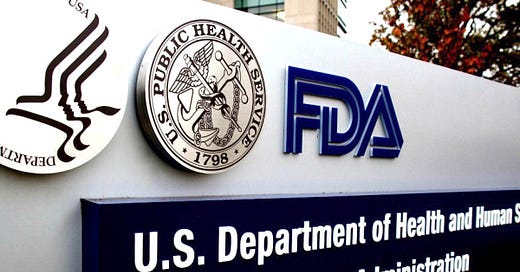Concerned about the FDA’s rushed Pfizer Approval? This isn’t the first rushed Drug this Year.
A mere 2 months before Pfizer’s vaccine approval another controversial drug gained FDA approval.
On August 23rd, 2021 the FDA granted its first approval to a COVID-19 vaccine. The approval was given to Pfizer and the vaccine, now marketed as Comirnaty. With a vaccine being granted FDA approval the push for greater vaccination has started, and many who are concerned about vaccine mandates are now being put into a hot seat.
However, immediately after the approval many within the medical community have sent out warnings that the approval did not meet the proper criteria.
Take a look at an op-ed piece written in the British Medical Journal (BMJ) by Peter Doshi, a senior editor.
That’s a damning statement if I ever saw one, and this isn’t the only one.
Although I won’t go into too much detail here (I suggest you all read Peter Doshi’s Piece) the points raised by Doshi are extremely concerning.
It indicates that Pfizer’s vaccines may not have met the FDA’s standard 50% efficacy rate for approval, and most alarming is that the trials seemed to have concluded before the spread of the Delta variant so insufficient data may have been collected against variants. To add onto that, participants were allowed to become unblinded and many people were allowed to be vaccinated, leaving only 7% of the people in the placebo arm blinded, hardly a good measure of a double-blind study.
As alarming as these findings may be, what’s even more alarming is that this isn’t the first time this year that the FDA rushed the approval of a drug.
On June 7th the FDA approved the usage of the monoclonal antibody therapeutic Aduhelm (aducanumab) for use in the fight against Alzheimer’s dementia. The therapeutic works by targeting the amyloid plaques associated with the progression of Alzheimer’s, with the hope that clearing these amyloid plaques would lead to increased cognition.
However, the science was not there to warrant an approval; two of the phase III trials conducted with aducanumab indicated futility, meaning that there was little evidence the studies would report a positive finding in amyloid plaque depletion.
When the data was reanalyzed, one study indicated a possible cognitive benefit from the therapeutic, although there was plenty of evidence to suggest no effectiveness. This indication is highly controversial, as many within the science community question the link between amyloid plaques and cognition.
In an editorial by Tagliavini et. al, 2021 they noted:
Approval was based on a surrogate clinical endpoint, namely the reduction of amyloid plaques in the brain, in the assumption that this is likely to translate into a clinical benefit to patients.
However, the scientific community does not entirely agree on the “Aβ cascade hypothesis” and the therapeutic effectiveness of removing amyloid plaques. Autopsy studies of patients subjected to active immunization showed that clearance of amyloid deposits neither halted nor slowed the progression of the disease, not affecting tau propagation and loss of synapses and neurons [8]. Following these controversies, the FDA did not grant the medication full approval. The agency ordered the drug’s makers to conduct a post-marketing phase IV study over the next 9 years to confirm the drug positive effect on cognitive deterioration. If clinical efficacy is not documented, approval will be withdrawn.
So here we have a therapeutic with extremely questionable efficacy gaining fast tracked FDA approval. Why would such a thing be allowed to happen?
It is not that hard to figure out; the estimated cost of aducanumab is $56,000 a year, and with over 6 million Americans estimated to be living with Alzheimer’s that would lead to to an estimated profit of $336 billion a year on this drug alone. It is also worth noting that the average American household income in 2019 is estimated to be just under $70,000, hardly above the annual asking price for aducanumab.
We are living in an era where the concerns about institutional capture have never been higher. We are constantly told to “trust the science” and yet there have been clear indications that the pathways through scientific rigor has been hijacked.
As noted in a BMJ editorial:
This evolving story may ultimately damage public trust in regulatory and licensing institutions. This is deeply undesirable at any time, but particularly in the middle of a pandemic when public trust in lifesaving vaccines is so imperative.
People with Alzheimer’s disease and their families need hope, not false hope. Aducanumab’s approval on a technicality could undermine regulatory standards designed to protect against false hope and “set a dangerous precedent.”1112
The fallout from aducanumab’s approval lead to the resignation of 3 members of the FDA’s advisory panel, with one of those members, Harvard professor of medicine Aaron Kesselheim, calling this approval “probably the worst drug approval decision in recent US history.”
We now have reports of 2 FDA officials resigning due to the push for booster COVID shots.
As the battle continues for pharmaceutical companies to seek FDA approval for their COVID-19 therapeutics, concerns will continue to be raised about the institutions role in our everyday lives, and unfortunately so far things don’t seem to be going too well.
Thank you for reading my newsletter. If you enjoy my articles please consider becoming a free subscriber in order to receive notifications.
And share with others who may find these newsletters interesting.
Also, please consider becoming a paid member. The research and work put into these articles takes many hours and being a paid subscriber allows me to continue to do this full time.





